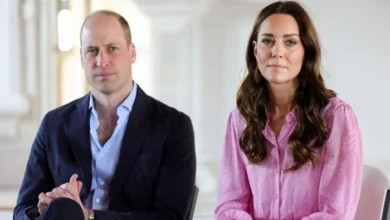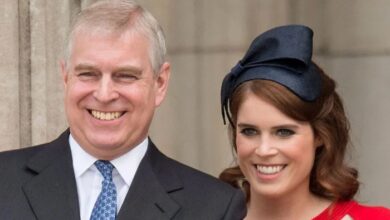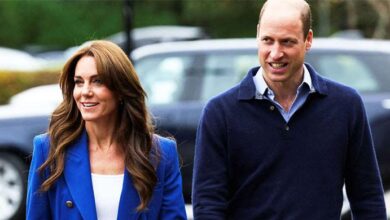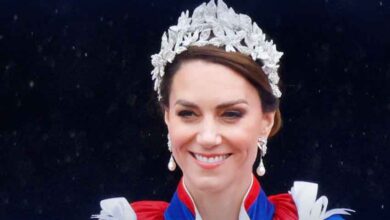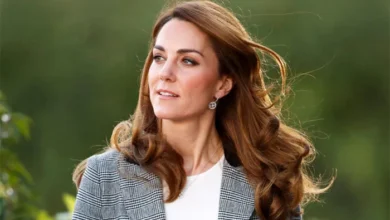Prince Harry Skips Family Funeral for Colombia Tour with Meghan Markle

In a move that has sparked significant controversy, Prince Harry has been criticized for missing a crucial family event—the funeral of his uncle—while traveling to Bogotá, Colombia, with Meghan Markle.
This decision has drawn sharp rebukes from various quarters, with critics highlighting what they perceive as glaring hypocrisy and questionable priorities.
The absence of Prince Harry from his uncle’s funeral in the UK has not gone unnoticed. The royal family had gathered to pay their respects, but Harry and Meghan Markle were conspicuously absent, instead opting for a high-profile trip to Colombia.
This decision has been met with intense scrutiny, particularly given the security concerns associated with their destination.
GB News’s Patrick Christys expressed his frustration, stating, “Prince Harry is missing his own uncle’s funeral in the UK because of security concerns.
Instead, he’s taking his wife to the cocaine-fuelled, gang-warfare, murdering hotspot of Colombia.” Christys’s remarks underscore the perceived contradiction between Harry’s decision to forgo a family obligation and his choice of travel destination.
Adding to the outrage, GB News presenter Emma Webb remarked, “You don’t say. Maybe Harry should be paying the reparations in Colombia for all of the cocaine that he’s used over the years.”
Webb’s comment brings to light a broader debate about the Duke’s past drug use and its implications in the context of his current public stance on various issues.
Businessman Adam Brook joined the chorus of criticism, labeling Harry as “as hypocritical as they come” and dismissing Meghan Markle as “one massive diva.”
Brook’s comments reflect a sentiment among some critics who see the couple’s actions as emblematic of broader issues of privilege and entitlement.
The trip to Colombia, while officially framed as a high-profile engagement, has raised concerns about the safety and appropriateness of their choice.
Labour minister Bill Rammell weighed in on the debate, stating, “As a minister, I went to Colombia three times, and I only went with protection officers because it’s the most dangerous country in the world.
And to compare safety in the UK to Colombia is just hogwash.” Rammell’s statement highlights the stark contrast between the security measures required in Colombia and those typically available in the UK, further intensifying the scrutiny of Harry and Meghan’s choices.
The controversy surrounding the couple’s trip comes amid ongoing discussions about their public and private lives.
Prince Harry and Meghan Markle have frequently spoken out on various social issues, advocating for causes such as mental health and environmental sustainability. However, their critics argue that their actions often contradict the values they promote.
In addition to the specific criticisms of their Colombian trip, the couple’s overall approach to their public image has been a topic of debate.
Critics have pointed to instances where their actions have seemed at odds with their stated values, contributing to a broader narrative of perceived hypocrisy. This narrative has been fueled by the couple’s high-profile lifestyle, which often contrasts with the more modest expectations of their royal roles.
Prince Harry’s absence from his uncle’s funeral has also drawn attention to the personal and familial aspects of the royal family’s life. While the royal family has traditionally maintained a public-facing demeanor, private events such as funerals are deeply significant.
Read More: Meghan Markle Talks About Son Archie on Her Colombia Trip With Prince Harry
The choice to miss such an event, especially in favor of an international trip, has been interpreted by some as a sign of detachment from traditional family obligations.
The reaction to Harry and Meghan’s Colombian trip is not just about the specific decision to travel but also reflects broader tensions around their public persona and private choices.
As public figures, the couple’s actions are scrutinized not just for their immediate implications but also for how they fit into the broader narrative of their lives and values.
In summary, the decision of Prince Harry and Meghan Markle to skip a significant family funeral for a trip to Colombia has ignited a firestorm of criticism.
The couple’s choice of destination, coupled with accusations of hypocrisy and privilege, has sparked a debate about their public and private priorities.
As the controversy continues, the public’s reaction highlights the ongoing scrutiny faced by the Duke and Duchess of Sussex, revealing the complex interplay between their personal choices and public perceptions.
